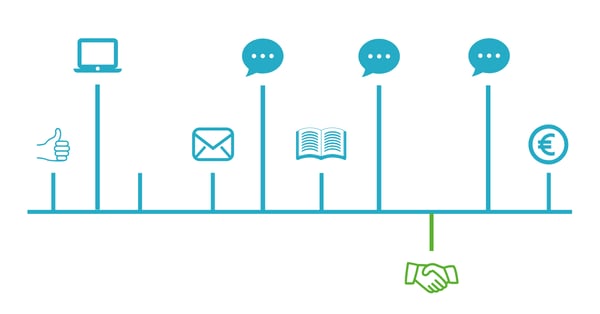Marketing an event is a time-intensive process, often requiring you to juggle countless tasks while staying on top of deadlines. Automation can lighten this load, improving efficiency without sacrificing results.
But choosing the right strategies to streamline your efforts is where the real challenge begins. This article explores key ideas for automating event marketing processes to improve efficiency.
If you’re planning an event, our guide, "Everything You Need to Know About Event Marketing," is worth reading.
Why Automating Event Marketing is Important
Automating event marketing holds significant importance for improving efficiency and achieving better outcomes. By reducing manual tasks, ensuring consistency, and optimizing resource allocation, automation allows you to focus on high-value activities.
Here’s why incorporating automation into your event marketing processes can deliver considerable benefits:
Automation saves time by eliminating repetitive manual tasks like sending emails, scheduling social media posts, or tracking attendee data. For example, automated email sequences can handle this process seamlessly instead of manually crafting and sending email reminders.
This time-saving effect enables your team to dedicate more effort to strategic planning and creative problem-solving, which are critical for delivering impactful events.
It also improves accuracy and consistency across marketing channels. Human error can lead to tone, branding, or timing inconsistencies, especially when campaigns span multiple platforms.
Automation tools ensure that your messaging remains uniform, whether it’s through email, social media, or event registration systems. This consistency builds trust with your audience while maintaining a professional image.
Another major advantage is the ability to improve ROI. Automation streamlines workflows, helping you allocate resources more effectively. For example, with automated lead tracking, you can quickly identify high-priority prospects, reducing time spent on unqualified leads. Additionally, by automating performance reporting and analytics, you gain real-time insights into campaign performance, making it easier to adjust strategies and avoid unnecessary expenses. This optimization directly impacts your bottom line, enabling you to do more with less.
Discover the ultimate resource for event marketing success with Lyyti's Guide for Trending Events. Learn how to move from event idea to promotion, market effectively, attract ideal participants, and utilize AI to optimize your processes. Download now for expert tips and cheat sheets to elevate your marketing strategy.
"Automation, paired with the right event management software, is a game-changer. It frees you from repetitive tasks, keeps everything organized, and lets you focus on creating impactful experiences that truly resonate with your audience." - - Petri Hollmén, CEO of Lyyti
1. Automate Email Campaigns
Automating email campaigns is a key element of efficient event marketing. By utilizing automation tools, you can deliver timely, targeted, and personalized communication, ensuring attendees remain engaged throughout the event lifecycle.
To streamline engagement, schedule personalized email sequences tailored to each stage of your event—pre-event, live-event, and post-event. For example, pre-event emails can provide early bird registration offers or event details, live-event emails can share session reminders or real-time updates, and post-event emails can request feedback or share recorded content. This ensures consistent communication while reducing manual effort.
Triggers based on user actions—like registrations or inquiries—enable precise and timely follow-ups. For example, an automated email can thank a user immediately after registration and provide the next steps, such as event agendas or log-in details for virtual events.
Similarly, inquiries about specific sessions can trigger a tailored response with relevant information, improving attendee satisfaction.
A/B testing email content is another powerful automation feature. You can identify what resonates most with your audience by testing variations in subject lines, call-to-action buttons, or email design.
Automation platforms can handle this process seamlessly, analyzing data and optimizing for higher open rates and conversions without requiring constant manual intervention.
By integrating these automation strategies into your email marketing, you can save time, improve engagement, and drive better outcomes for your events.
Plan your event communications effortlessly with Lyyti's Event Communication Timeline Template. This step-by-step guide helps you schedule and execute engaging communications at the right time. Download the template now!
2. Schedule Social Media Posts
Automating your social media posting can significantly improve both the efficiency and consistency of your event marketing efforts. By scheduling posts in advance, you maintain a steady flow of content across platforms, ensuring your audience stays engaged without requiring constant manual oversight.
This approach lets you plan campaigns holistically, aligning posts with event milestones, ticket sales deadlines, or promotional offers. It also reduces the risk of gaps in communication, which can harm audience interest or brand visibility.
Utilize AI-driven tools to spot the best times to post for each platform. These tools analyze user activity patterns, engagement rates, and other metrics to recommend time slots when your audience is most active.
Posting during these windows maximizes reach and interaction, which can drive traffic to event pages and increase registrations. Tools like Hootsuite or Sprout Social offer robust scheduling features integrated with analytics, making it easier to implement data-backed decisions.
Additionally, automated social listening tools can track mentions of your event, monitor relevant hashtags, and identify emerging trends. With this information, you can quickly respond to audience feedback, address questions, or capitalize on trending topics to amplify your event’s visibility.
For example, tools like HubSpot allow you to identify user-generated content or influencer posts mentioning your event, which you can then share to build trust and excitement among potential attendees. This kind of real-time adaptability improves engagement while reducing manual monitoring efforts.
3. Use Event Management Software
Event management software is a comprehensive tool designed to streamline the planning, execution, and analysis of events. By consolidating various functions—such as scheduling, attendee management, and communication—into a single platform, it enhances efficiency and coordination across teams.
Benefits of Event Management Software:
Centralized Operations: Manage all event-related tasks within one interface, reducing the need for multiple tools and minimizing errors.
Automation: Automate repetitive tasks like sending invitations, reminders, and follow-ups, freeing up time for strategic planning.
Data Integration: Seamlessly integrate with CRM and analytics tools to gain insights into attendee behavior and event performance, facilitating data-driven decisions.
Lyyti is an all-in-one event management platform that empowers organizations to create meaningful encounters across various event types—live, online, and hybrid.
Here are the key features of Lyyti:
Invitations and Registrations: Customize registration pages and efficiently manage participant data.
Automated Communications: Streamline event communications through automated emails and SMS, ensuring timely and targeted engagement.
Reporting and Analytics: Access real-time data to measure event impact and ROI, enabling continuous improvement.
Survey Tools: Collect feedback seamlessly to enhance participant satisfaction and inform future events.
Integrations: Connect with various CRM and marketing automation platforms to ensure cohesive data flow and enhanced functionality.
Event Check-In App: Facilitate smooth on-site or virtual check-ins, improving the attendee experience.
Ticketing and Payments: Simplify the process of selling tickets and receiving payments, enhancing operational efficiency.
By utilizing Lyyti's features, you can automate and optimize their event management processes, leading to more successful and impactful events.
4. Automate Lead Generation and Tracking
Automating lead generation and tracking can significantly improve your engagement with potential event attendees and follow-up with them effectively. By streamlining these processes, you can save time, ensure accuracy, and focus on converting leads into participants.
Automated landing pages and forms should be implemented to capture attendee information seamlessly. These pages should have a single, clear call to action and a design free of distractions to guide visitors to complete the form. Balance the number of required fields to collect enough data without discouraging submissions.
Forms can automatically organize leads into lists based on user inputs or activity, reducing manual sorting. This approach ensures that every lead captured is ready for immediate follow-up or nurturing.
Another key aspect is utilizing tracking pixels and cookies to monitor user behavior. These tools allow you to track how potential attendees interact with your website or ads. For example, you can see which pages they visit, how long they stay, or if they abandon a registration process. This behavioral data is invaluable for retargeting campaigns, helping you re-engage users who showed interest but didn’t convert. Retargeting ads can display personalized messages or offers, increasing the likelihood of lead conversion.
Additionally, connect your captured leads directly to a CRM system. This integration ensures that your sales or outreach teams have instant access to the most up-to-date lead information. Automated workflows in the CRM can trigger tasks such as sending follow-up emails, assigning leads to specific team members, or scoring leads based on their activity. Centralizing data and automating these steps eliminates delays and maintains momentum in your lead engagement efforts.
5. Use AI for Personalized Recommendations
AI has become an irreplaceable tool for delivering personalized recommendations that can significantly improve event attendees' experiences. Utilizing its capabilities allows you to create tailored interactions that meet individual preferences while improving overall engagement.
Use AI algorithms to suggest relevant sessions, booths, or networking opportunities. To make recommendations, these algorithms analyze attendee data, such as past event participation, interests, or professional backgrounds.
For example, an attendee interested in emerging technologies could receive suggestions for sessions on AI advancements or booths featuring tech startups. This targeted approach simplifies decision-making for attendees and ensures they derive maximum value from the event.
Enable chatbots to provide tailored answers to attendee questions. AI-powered chatbots can interpret queries and respond with personalized recommendations in real-time. For example, a chatbot could guide attendees to specific workshops or networking mixers based on their input, such as “I’m looking for beginner-level sessions on digital marketing.” This functionality reduces the need for on-site staff while offering immediate, relevant assistance.
Analyze attendee data to generate personalized offers or follow-up content. Post-event, AI tools can assess attendee behavior, such as session attendance or survey responses, to create individualized follow-ups.
Someone who attended multiple sessions on sustainable practices might receive a whitepaper or an invitation to a related webinar. This targeted outreach deepens engagement and keeps your brand top-of-mind, driving stronger relationships.
By fully integrating AI into your event marketing strategy, you can deliver meaningful, customized experiences that resonate with attendees.
6. Automate Analytics and Performance Reporting
Automating analytics and performance reporting is important for streamlining your event marketing efforts and ensuring data-driven decision-making. By utilizing automation, you can reduce manual workload, improve accuracy, and gain actionable insights to refine your strategies.
Real-time dashboards provide an ongoing view of key performance metrics during your event. These dashboards allow you to track registration numbers, attendee engagement, session attendance, and other critical KPIs as they evolve. This continuous monitoring helps you identify and address issues as they arise, such as low engagement during a specific session or bottlenecks in check-in processes. Automated data aggregation and visualization tools enable quicker and more informed adjustments on the fly.
Post-event reporting is another area where automation adds significant value. Automated systems can compile attendee feedback, survey results, and financial data to evaluate satisfaction levels and calculate event ROI. For example, after the event concludes, automated surveys can be sent to attendees, vendors, and sponsors, and their responses can be collated and analyzed without manual intervention. This saves time and ensures that insights are ready faster, allowing you to act on them for future event planning.
Using predictive analytics can elevate your event strategy further by anticipating trends and areas for improvement. By analyzing historical data, such as attendee demographics, registration patterns, and past engagement metrics, predictive tools can forecast attendance numbers, preferred session topics, or even likely no-show rates. This foresight enables you to optimize resource allocation, marketing efforts, and content planning.
Automation in analytics also ensures consistency and accuracy in your reporting. Manual data entry or analysis can lead to errors that skew decision-making. Automated systems eliminate this risk by directly pulling data from reliable sources and presenting it in pre-defined formats. Additionally, integrations with CRM or marketing automation tools provide a centralized view of attendee behavior across touchpoints, from initial registration to post-event interactions.
The Experience Value Score (EVS) is a unique metric that captures attendee experiences, providing immediate feedback and actionable insights across live, online, or hybrid events. EVS simplifies event evaluation with a single question: "Was the event worth your time?" This high-response-rate approach enables you to measure event value effortlessly while identifying areas for improvement.
You can explore the power of EVS through Lyyti’s free report, which includes data from over 200,000 answers and insights from 500+ companies. Download the report to discover how EVS can help you track industry averages, identify high-converting events, and continuously improve your event strategies.
Conclusion
Streamlining event marketing through automation is both a practical necessity and a competitive advantage. By reducing manual effort, it enables teams to focus on strategy and creativity while improving precision and scalability.
As tools and technologies continue to evolve, the ability to automate complex workflows will be integral to achieving consistent results. With the right systems in place, event marketers can save time, increase impact, and deliver a seamless experience for their audiences.
Lyyti is an event management software designed to simplify and enhance your event marketing processes. From automating communications to tracking analytics and ROI, Lyyti provides tools and features that help you efficiently plan, execute, and evaluate all types of events—live, online, or hybrid.
Aligned with the Key Ideas for Event Marketing Automation to Enhance Efficiency, Lyyti empowers you to save time, reduce manual effort, and achieve measurable results. Its user-friendly platform ensures a seamless experience for both organizers and attendees.
Ready to transform your event marketing? Book a demo today and explore how Lyyti can help you succeed.
FAQ
What Are the Most Effective Event Marketing Automation Tools for Small Businesses?
Use tools that automate registration, email campaigns, social media scheduling, and analytics. Choose based on your needs, budget, and event complexity to save time and boost efficiency.
How Can I Measure the ROI of My Event Marketing Automation Efforts?
rack metrics like registrations, engagement, and conversions. Compare results with your investment and use analytics to evaluate cost savings, efficiency, and revenue generated.
What Are Some Common Mistakes to Avoid When Implementing Event Marketing Automation?
Avoid generic messaging, over-automation, poor tool integration, and ignoring analytics. Balance automation with personalization and optimize campaigns based on performance insights.
How Do I Integrate Event Marketing Automation With My Existing CRM and Marketing Platforms?
Use tools with seamless integrations or APIs. Sync data, automate workflows, and ensure two-way communication between platforms for consistency and efficiency.
Can Event Marketing Automation Personalize the Attendee Experience, and If So, How?
Yes, automation personalizes experiences by segmenting audiences and tailoring communications, recommendations, and reminders. This improves engagement and attendee satisfaction.








